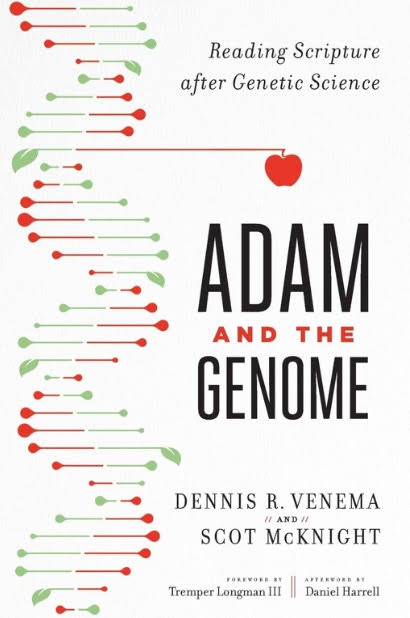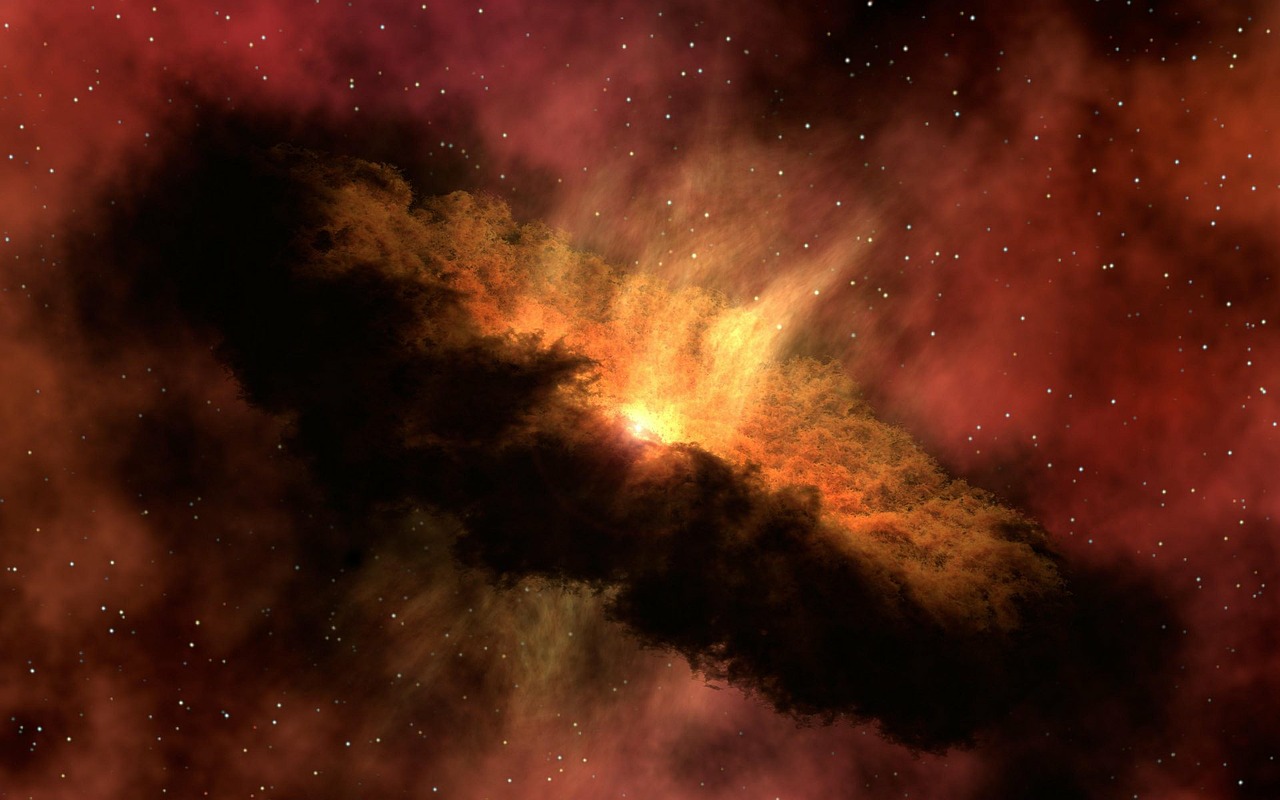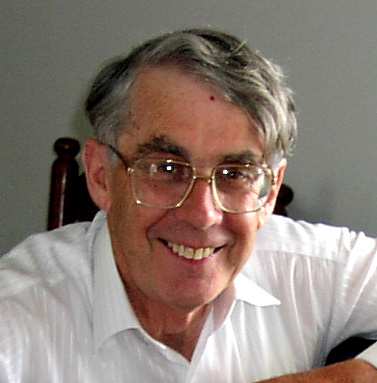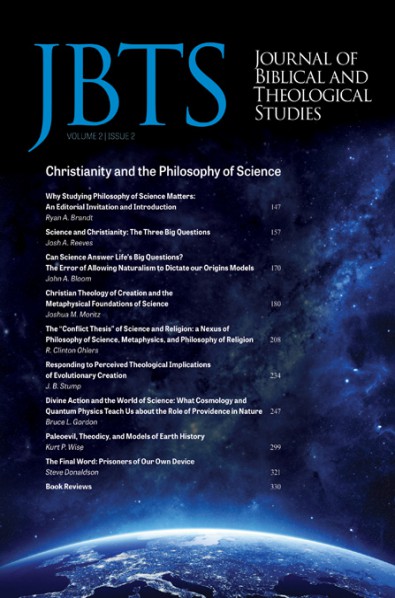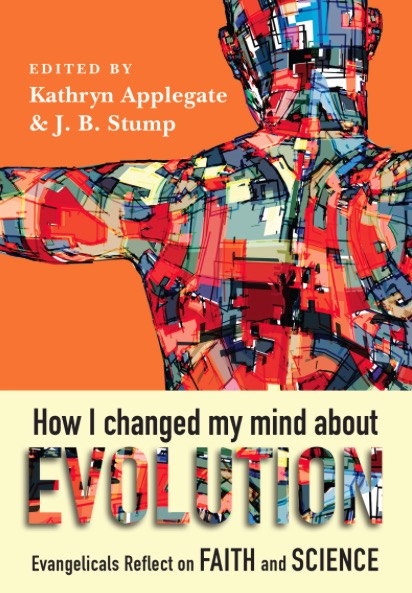


Assumptions of Science and the Christian Tradition
Mark Worthing, October 2009.
Assumptions of science and the Christian tradition
Mark W Worthing
Rev. Dr Mark Worthing, BA in religion (Michigan), MDiv (SBTHS), STM (TLS), PhD (Regensburg), Dr Theol (Munich) is a Lecturer and Dean of Studies at Tabor College, Adelaide, Australia. He has studied extensively in both Europe and America. Living with his wife Kathy and their four children in Hahndorf, his hobbies include farming, chess and running.
Mark is an ordained Lutheran pastor and an author of several books and articles about Christian theology. His book God, Creation and Contemporary Physics (Fortress Press 1996) won the 1997 Temple Book prize for new works in the field of science and religion.
This paper was presented at the Conference on Science and Christianity (COSAC) 2003 held at Avondale College, Cooranbong, New South Wales, Australia from 18 to 20 July 2003. It was first published in COSAC2003 Collected Papers: God, Science and Divine Action: God’s Interaction with His Creation.
Abstract
Often, science has been supposed to make no presuppositions, to deal only with facts (in contrast to religion), and that its progress is morally good. These statements are critically examined. In fact, science makes basic assumptions that cannot be absolutely proved, and has arisen beside and often out of religious world views. Nothing in science can be finally verified.
Key words
Presuppositions of science, verification, falsification, Christian influence on science.
Introduction
We live in a world of shortcuts. Perhaps it’s just our human nature. How many of us, upon acquiring some new piece of technology, say a DVD player, or a new laptop, bother to read the instruction booklet before attempting to get the apparatus functional. If you are like me, you simply start connecting things that look like they go together, hoping the device will work once assembled and plugged in. Only when I find that my new
toy isn’t working as it should, and after several attempts at gut feeling trouble-shooting, do I bother to tear open the plastic bag containing the instruction booklet – which is what my wife has been insisting all along that I do. One would think that after a succession of encounters with new technology, none of which I have been able to install successfully based upon natural instinct, that I would save time and not risk damaging expensive equipment in future and begin with the instruction manual. I know it’s the sensible thing to do, but somehow, I suspect that twenty years hence when I open my new pocket plasma screen mini-DVD player, with cell phone, word processor and radar detector on Christmas morning, I will be spending most of the afternoon trying to make it work while my wife checks from time to time on my progress, urging me to read the instruction manual before I stuff something up.
Our modern tertiary educational system reflects in many ways this same desire to simply ‘do things’ without getting bogged down in uninteresting and probably unnecessary instructions. At Tabor College, where I teach, our counselling students just want to get on with counselling, our teacher education students want to get into the classroom, and our ministry students simply want to start preaching. Many wonder what value foundational subjects like ethics, philosophy, biblical studies, etc actually have for them. And all this within a system that is already highly focused on professional preparation, that is, modules that actually teach you how to do things. When it is suggested that ideally they should also have some basic subjects on the sciences, history, sociology, literature, etc we generally only get blank stares of disbelief; ‘But why would I need any on that?’ Like all tertiary institutions, we prepare people for specific vocations, and try as best we can to get away with a little bit of education in the process. We have little choice. If we added too many general knowledge modules, or made our degree programmes four rather than three years (like in the American system) to allow for a year of general humanities and sciences, we would simply go out of business. Students would choose institutions that can deliver them a degree more quickly that will qualify them for what they want to do.
The same situation presents itself also in the sciences. Ideally, as a prerequisite to those modules that actually prepare students to work in some particular field of the sciences, a module each on the history and philosophy of science would be taken. And in our utopian university, our budding future scientists would get even more out of these subjects for they would have already taken tertiary level introductions to history and philosophy. Their modules on sociology would help them understand the impact of their own chosen field on the community at large, and their modules on literature, English language and public speaking would help them better communicate their ideas to non-specialists, thus avoiding unnecessary misunderstandings. But alas, in the real world of Australian tertiary education, this is not what occurs. In most cases, we are fortunate if in some particular module a bit of room is made for the history and philosophy of science. In other cases, not even this much may occur. Many of our universities, a majority of whose students are studying in some area of the sciences, broadly understood, have not a single person
specialising in either the history or philosophy of science. Industry does not require it, students by and large do not see the need, and university administrators are not going to make funding available for something that is not going to produce research leading directly to new and marketable technologies. Those in the sciences with a fair grasp of the history and philosophy of science are either largely self-taught, were trained elsewhere, or were fortunate to have had one or two lecturers who took a special interest in these areas. In an age of shortcuts, Australia is extremely competitive at turning out good technicians in the least amount of time and at the lowest cost possible.
But this leaves me with a dilemma when asked to talk about the assumptions of science. On the one hand, there are the formal assumptions developed through a succession of philosophers of science who have sought to understand precisely what it is that science is and does. The history of science in general, as well as the histories of the particular fields of science, illustrate the reasons that these particular assumptions work better than other sets of assumptions. On the other hand, we are confronted with the great majority of those actually working within the various fields of the sciences today who appear not only happily unaware of many of these assumptions, but are in fact quite often committed to another set of assumptions that can best be described as informal or ‘folk’ science.
The dilemma is not unlike that which I face when someone asks me as a theologian what my own Lutheran tradition believes. And I suspect theologians of other traditions face a similar problem. I could tell them what the Lutheran tradition ideally holds to in its historical documents and in the best expressions of its theology. Or I could tell them what actual Lutherans they are likely to encounter in one of our contemporary Australian congregations are actually likely to believe. To be completely fair and honest, I would probably have to talk both about the ideal and the popular reality. Similarly, to answer the challenge put before me by this present topic, I will look at both the popular assumptions, and the formal assumptions. First, the popular assumptions of folk science.
Assumptions of popular or folk science
The following is by no means a complete list, but is a collection of key assumptions that I have actually encountered among those working or studying in the sciences and which concern me not only from the perspective of the philosophy and history of science, but also as a Christian theologian.
-
Science is presuppositionless.
This was actually a formal assumption of science until early in the twentieth century and was one of the main points that was thought to distinguish science from theology. The assumption was, and in many places still is, that science and scientists come to any particular question as completely fair and open-minded observers with no pre-commitments
or assumptions that may impact upon either their observations or their interpretations.
-
Science deals with facts, whereas religion deals with feelings/faith/fiction
This assumption played itself out perhaps most famously in the philosophical movement of logical positivism, which drew the obvious conclusion that statements about physical data or events are meaningful, but statements about metaphysics or religion are by nature meaningless.
Logical positivism, which arose out of the movement of analytical philosophy (including Frege, Russell, Ryle, Ayer, et al.) and was taken up and advocated by the ‘Vienna circle’ (especially Moritz Schlick and Rudolf Carnap), essentially put forward the epistemological view that there are only two kinds of meaningful statements: empirical statements, which can be verified through sense experience; and analytical statements, which are restricted to an analysis and definition of terms and are therefore either true or false by definition.
The ‘founder’ of modern logical positivism, Ludwig Wittgenstein, contended in his Tractatus logico-philosophicus (1921) that ‘all philosophy is a “critique of language”’(4.0031).1 Wittgenstein was critical of previous philosophy, maintaining that most of the sentences and questions it produced are only made possible by the fact that we do not understand our linguistic logic (Sprachlogik) and that for this reason the deepest
problems of philosophy are in reality no problem at all (4.003). For Wittgenstein the only ‘strictly correct’ philosophy can say nothing that is meaningful about ‘philosophy ‘ and metaphysics. According to Wittgenstein: ‘The correct method of philosophy would really be the following: to say nothing except what can be said, i.e. propositions of natural science – i.e. Something that has nothing to do with philosophy – and then, whenever someone else wanted to say something metaphysical, to demonstrate … that …[they] had failed to give a meaning to certain signs in … [their] propositions. ‘ (6.53).
This meant that Wittgenstein ‘acknowledged only those statements to be meaningful which could be empirically verified or were of a purely logical- analytical nature’. For the logical positivists,
since statements about God are in principle not empirically verifiable … they are not only false but are from the outset meaningless as assertions.
Pannenberg 2001 p. 7
Yet logical positivism, with its radical application of the criterion of meaningfulness, was not able to maintain its place as the dominant philosophy of science in large part because of its radical principle of
1 For this and the following, see Wittgenstein (1921).
verification, which, as it turned out, could not itself be verified. The irony, of course, is that even Wittgenstein himself seemed to anticipate this, viewing it even as necessary:
My propositions serve as elucidations in the following way: anyone who understands me eventually recognises them as nonsensical, when he has used them – as steps – to climb beyond them. (He must, so to speak, throw away the ladder after he has climbed it.) He must transcend these propositions, and then he will see the world aright.
Despite being long out of favour in the philosophical community,
6.54
Wittgenstein and logical positivism continue to have a lasting impact on the assumptions of many within the scientific community.
-
Scientific research and knowledge is morally good and is connected to progress, which is also morally good.
The faith in scientific progress in our generation is so well known as to be almost a cliché and needs little explanation. The following quote from Carl Friedrich von Weizsäcker’s Gifford Lectures summarises well the confidence many have that science is by nature good and leads inevitably to progress.
If you ask me what makes the Siamese twins of science and technology the idols of our time, the answer ought to be: it is their trustworthiness. … When the care, the electric light, the telephone fail we do not blame science for being wrong but we blame the individual gadget for being defective, for not corresponding to the standard set by science itself. Such is our faith in science.
von Weizsäcker 1964 p. 14
-
Historically, science arose independently of and in opposition to religion and thrives best when left alone.
The debate over Darwin’s theory produced tensions between some members of the scientific and theological community that had not been previously seen. Some were inclined to read these tensions into the whole history of the science and religion relationship. Most famously, a view of the history of science and religion (particularly Christianity) was created, one might say, almost ex nihilo, by John William Draper (History of the Conflict between Religion and Science, 1875) and Andrew Dickson White (A History of the Warfare of Science with Theology in Christendom, 1896). They portrayed the entire history of scientific development as a war against a bigoted and narrow-minded establishment Christianity (the Roman Catholic Church is almost exclusively singled out by Draper) that feared science and was being engulfed by its advance. Draper, warning of an intensified conflict between science and religion, concludes his book with the admonition that:
Faith must render an account of herself to Reason. Mysteries must give place to facts. Religion must relinquish that … domineering position which she has so long maintained against Science. … The ecclesiastic
must learn to keep himself within the domain he has chosen, and cease to tyrannize over the [natural] philosopher, who, conscious of his own strength and the purity of his motives, will bear such interference no longer.
Draper 1875 p. 375
Even White, whose views were somewhat more moderate than those of Draper, painted the various conflicts between theology and science, both real and imagined, as one-sided affairs in which an aggressive and overbearing ecclesiastical structure continually seeks to suppress a pure and truth-seeking science and its unassuming practitioners (White 1896).
The warfare model of Draper and White has had far-reaching consequences. Their historical interpretation became an assumption not only of most scientists, but of many theologians as well. Many of the myths they created still cling tenaciously to our modern psyche and are accepted as truths so obvious that they need not be sourced. Out of this model, for instance, arose the still popular view that Copernicus held back publication of his De Revolutionibus out of fear of persecution by the church. Yet Copernicus, himself a minor church official, had already outlined his views years before his death in the brief Commentariolus. The only pressure Copernicus received from church officials came from several members of the Lutheran University of Wittenberg (where Martin Luther was at the time teaching) and from Cardinal Schönberg in a letter to Copernicus dated November 1536. Both sources urged him to publish a full account of his theory so that it could be studied. In fact, Fred Hoyle, no friend himself of Christianity, conceded that:
the factors which deterred Copernicus [from publication] must either have been scientific or were personal to himself.
Hoyle 1973 p. 32f
Yet the image of a revolutionary astronomer fearful of the church’s reaction to his theory persists.
The Galileo affair, the actual details of which are embarrassing enough to the church, was reinterpreted. Ignored were the personal conflict between Galileo and his one time supporter, Pope Urban VIII, Galileo’s pro-Spanish connections at a time when Spain was putting pressure on the papacy, and, perhaps most significant, the fact that Galileo was so frustrated by the Pope’s arguments against the Copernican theory, put to him in personal conversation, that he put them into the mouth of the fool Simplicius in his next book.
But perhaps most intriguing of all is the success of the attempt to credit the church with the medieval superstition held in some quarters that the earth was flat. Indeed, even today many scientists and not a few theologians caution against a return of the church to the days in which it held to a flat earth. The only problem is, neither the church, nor any of its teachers, ever held to a flat earth. Medieval diagrams of the world portrayed it as a circle and philosophy and theology texts alike spoke of it as round or as being a sphere.
Yet despite the often poor documentation and obvious prejudice of the Draper-White thesis, as well as its eventual rejection by most respected historians of religion and science, it contained sufficient measure of truth to sustain its influence and colour, to this day, the views of many in both the scientific and the religious communities.
-
Science can prove or verify its theories.
Science, and science alone, it is often assumed, can finally establish what is and what is not true.
-
Only the material realm is real
Science, by its very nature, is understandably prone to physical reductionism. Everything must ultimately be subject to physical explanation. Because science can only explain what it can see, touch, taste, etc. there arises the view that something that cannot be so observed or tested is not real. The spiritual realm, prayer, divine providence, indeed, God’s self, all fall into the category of that which is beyond the explanatory reach of science and therefore, simply not real.
We could enumerate more such common assumptions – and I’m sure many of you could add to the list. Many of these were once formal assumptions of science that have since been abandoned by science’s best thinkers. Others are simply misunderstandings. But these and other assumptions of their ilk, despite all the progress of the history and philosophy of science and the theology/science dialogue of recent decades, continue to exercise a powerful role in the popular scientific imagination. These assumptions, both individually, and as a set, provide an intellectually hostile environment for Christian thought and dialogue. Fortunately, they are not representative of the current state of research in the history and philosophy of science.
Current formal assumptions
Science makes a number of important assumptions. We cannot enumerate all of them here. What follows is a selection of current formal assumptions that challenge and/or correct some of the assumptions of folk science identified in the previous section.
-
Science is based on a number of foundational presuppositions that cannot be absolutely proven.
Science is not presuppositionless. It is not a neutral entity or blank slate that has no specific commitments. It is committed to certain fundamental assumptions, for instance, that the world is real and is knowable, that at the end of the day must simply be presupposed. There are numerous methodological assumptions as well about everything from the relationship between cause and effect to the neutral impact of the observer to belief in the unchanging nature of the laws of physics. We can add to this a whole slate of theories and laws that any particular regional science simply assumes (some of which have been spectacularly challenged in recent years, such as the invariableness of the speed of
light, or the decelerating nature of the big bang universe). One can hardly say that science, in contrast to theology, comes to its task without presuppositions. Indeed, the nature and scope of the presuppositions are often quite different. But fundamentally, the epistemological gulf that was assumed to exist between scientific and theological statements has been steadily shrinking.
-
Scientific research and knowledge is morally neutral. Knowledge and technical ability is itself neither good nor bad, but its application may well be.
At the end of the 19th century and early in the 20th century science and the technology that accompanied it was viewed almost with messianic expectation. Even today, the terms ‘scientific progress’ and ‘advances in technology’ roll easily off our tongues. We have inherited a non-value free language of science that still reflects much of the undaunted optimism of a previous age. We are slowly learning to think differently, however. Not all scientists are working for the advancement of humanity. Some are working to create weapons to destroy their enemies, or on technology that will bring greater profit for their corporate sponsors, with little regard for environmental, sociological, or wider economic impact. We are also, at least formally, more aware of the need to examine possible applications of new technologies ethically and not simply to assume that they must be good – though we still have a ways to go in this department. No one doubts that science has improved life greatly, and very few would seriously advocate turning back the scientific and technological clock. But we are perhaps less naïve today than in previous generations about the nature of knowledge. To know and understand the world around us better is neither morally good nor morally bad. What we do with that knowledge is a different story.
-
Science arose alongside of and in many cases out of religious worldviews. Christianity played a particularly important role in the rise of modern science.
Most historians of science now recognise the complexity and inter- relatedness of the history of scientific and religious ‘knowledge,’ and the significance of this relationship for understanding the nature and function of both.
As we all know, the quest for knowledge of our physical world through observation and experimentation, and the effort to describe and harmonise these findings through theories and mathematical formulas, is to be found in ancient cultures ranging from Babylon and Egypt in the Near East to Greece and Rome in the West.
The ancients compiled an impressive record of ‘scientific’ accomplishment in fields ranging from physics, mathematics and astronomy to anatomy, medicine and botany. It is too simplistic, however, to attribute to the ancients a commendable anticipation of the methods of modern scientific research. Their intellectual world was not divided into neat categories such as physics, ethics, mathematics, theology, astronomy, and metaphysics.
In antiquity, the world was viewed as a unified and coherent whole. The ancients quite often mixed discussions of physics and metaphysics, mathematics and magic, geometry and theology, astronomy and astrology, all much to the chagrin of their modern successors.
Astronomy and astrology were so intertwined, in fact, that one could often not distinguish the one from the other. It was not so much the desire to understand the workings of the physical reality we call the universe that led the ancients to study the stars and the planets as it was the desire to be able to ‘divine’ the future or understand the various ‘astral deities’ that the heavenly bodies were thought to represent. A cursory reading of almost any ancient or even medieval book of ‘science ‘ will show that this mixing of science, religion, philosophy and even magic persisted up to the dawn of the modern age. Indeed, Harold Nebelsick suggests:
the main motivating force behind the pursuit of natural knowledge from the time of Babylon and Greece in the East to the time of the Renaissance in the West was theological rather than scientific.
Nebelsick 1985 p. xiii
The recognition of this relationship between ‘religious’ and ‘scientific’ ways of knowing in the ancient world up through the medieval period is significant inasmuch as it sheds light on the conflict of the sixteenth and seventeenth centuries when science and theology split away from one another. Although reputable historians have long since abandoned the idea, it is still popular in some circles to conceive of the entire conflict as the misguided and perhaps even malevolent attempt of the Church to hold a monopoly on all truth at the expense of intellectual freedom and progress in the realm of physical knowledge. Yet far from being millennia long adversaries, the forerunners of modern science and theology were – up until the last four or five centuries – often difficult to distinguish from one another.
And in those situations in which people did begin to ask questions about the world around them that we might rightly view as scientific – or at least proto-scientific – it was very often the Judeo-Christian tradition (and in the Muslim world the Islamic tradition) that played a necessary role. In a world in which spirits and powers and a host of assorted divinities were understood as the de facto explanation for good fortune and bad, for everything from the weather and crops to human fertility and natural calamities, there was little need to seek any explanation apart from the locally accepted deities. The monotheistic religions, however, stripped away these explanations and reduced deity to a single, non-physical transcendent reality. The physical world was de-sacralised and thinking people were free to seek physical explanations for the events of the world around them. For the first time, when crops began to falter, we looked at soil and water, not the gods. When a child died we did not ask which deity had been displeased but we sought an explanation for the death – in the hope that we could learn from it and minimise such occurrences in future. Without the impact of the monotheistic traditions, especially Christianity in Western Europe, the scientific revolution that eventually occurred would have been unthinkable.
-
Verification is an illusion. Nothing can be absolutely and finally verified.
A very significant milestone in the history of the philosophy of science was the appearance in 1934 of Karl Popper’s Logik der Forschung (The Logic of Scientific Discovery). Though since superseded in a variety of ways, it represents a fundamental change in the recognition of what science can and cannot do. Popper rejected the rationality model of logical positivism. In doing so the logical positivist claim that metaphysical statements are meaningless was rejected. This shift in the philosophy of science is of great significance not only for the natural sciences but also for philosophy and theology. Popper also sought to find a criterion other than verification that would enable us to distinguish between the empirical sciences on the one hand, and metaphysics, mathematics and logic on the other, since verification, in the strict sense of the logical positivists, was not suited to this task (Popper 1968 p. 34). He suggested, ‘that not the verifiability but the falsifiability of a system is to be taken as a criterion of demarcation. ‘ (Popper 1968 p. 40) Popper considered a theory to be falsified only if certain basic statements are accepted that contradict it. Crucial for Popper, however, is that a statement or theory is falsifiable, which means that it must ‘stand in a certain logical relationship to possible basic statements. ‘ (Popper 1968 p. 86f). For Popper, falsifiability stands in close relationship to consistency, a further condition that an empirical system must meet. As he explains:
Statements which do not satisfy the condition of consistency fail to differentiate between any two statements within the totality of all possible statements. Statements which do not satisfy the condition of falsifiability fail to differentiate between any two statements within the totality of all possible empirical basic statements.
Popper 1968 p. 92
Popper rejects verification since empirical statements can only be tested by trying to falsify them, which includes checking their consistency. Yet although theories are not verifiable they can be ‘corroborated’. Hence instead of discussing the probability of a theory or hypothesis Popper suggests that:
we should try to assess what tests, what trials, it has withstood; that is, we should try to assess how far it has been able to prove its fitness to survive by standing up to tests. In brief, we should try to assess how far it has been corroborated.
Popper 1968 p. 251
Interestingly, the theologian Wolfhart Pannenberg, accepted not only Popper’s emphasis upon falsification, but also contended that we should seek a provisional ‘verification’ or a ‘corroboration’ of theological statements. In doing so, Pannenberg chose not to accept Popper’s sharp distinction between verification and falsification, that falsification is no more final than verification.
If Popper wrought a fundamental shift in how science was perceived, his was not the last word. Clearly, there was no going back to the
assumptions that our scientific methods could absolutely, in the strictest sense, prove anything. But did Popper go far enough?
The American historian of science Thomas Kuhn broke through Popper’s critical rationalism and proposed that scientific revolutions be seen as a process, a move that enabled him to point to the approximate character of both verification and falsification, which are necessary correlates. As Pannenberg explained, Kuhn’s description of the processes involved in scientific revolutions ‘destroys the illusion that Popper’s criterion of falsification can be clearly applied at any time’. Rather, such questions are ‘the subject of an often lengthy process of scientific discussion’. (Pannenberg 1976 p. 57) Kuhn, in his groundbreaking book The Structure of Scientific Revolutions, summarised his critique of Popper’s theory of falsification as follows:
The role … attributed to falsification [by Popper] is much like the one this essay assigns to anomalous experiences, i.e., to experiences that, by evoking crisis, prepare the way for a new theory. Nevertheless, anomalous experiences may not be identified with falsifying ones.
Indeed, I doubt that the latter exist. … No theory ever solves all the puzzles with which it is confronted at a given time. … If any and every failure to fit were ground for theory rejection, all theories ought to be rejected at all times. On the other hand, if only severe failure to fit justifies theory rejection, then the Popperians will require some criterion of ‘improbability’ or of ‘degree of falsification.’
Kuhn 1970 p. 146f
Importantly, falsification was not allowed to simply become the flip side of verification. Of course, no one was suggesting that science could not tell us any number of things, or that scientific conclusions should not be trusted. Rather, these developments in the philosophy of science suggested, from the standpoint of critical rationalism, that science in the strictest sense does not represent infallible knowledge.
The nature of scientific method drives science toward reductionism. Science as science can only work with that which is subject to measurement, observation, etc. The tendency is to assume that anything beyond its reach is not real. But the best science increasingly recognises that there may well be realities beyond its scope – though not all would agree with this possibility. This, then, is not so much an assumption as an important emerging recognition. But its significance for our present discussion warrants its inclusion here.
By its very nature, science, even that science undertaken by those committed to the Christian faith, works exclusively with physical realities and explanations. And so it should. Calling upon a god-of-the-gaps to fill voids in our understanding is neither good theology nor good science.
Christians in science do not invoke God as scientists. That is not to say that God is irrelevant to their work. Their insights often help them gain new appreciation of God as creator. They give thanks to God for their abilities and opportunities, and they may well pray for strength in their work. They do not, however, (or at least should not) invoke God as
explanatory principle when their theories hit a dead end. Their task as scientist is to seek physical explanations. They are as free as anyone else to consider the theological implications of their research – or to think about implications of a Creator for the physical world – but when they do this they must recognise that they are no longer doing science. Christians recognise the limitations of science.
There is no disagreement here. What has been problematical is the assumption that when one reaches the boundaries or limits of what can properly be understood as the realm open to science, that there reality stops as well. There is increasing openness among scientists of all religious persuasions as well as those with no formal religious commitments at all to the possibility that simply because something, say for instance ‘spiritual realities’, is beyond the scope of science, does not mean that it is necessarily not real. I suspect the permeation of post- modern assumptions has played some role in this emerging attitude. But that is not so important. What is important is that we can now more openly and honestly work exclusively with physical explanations within our particular field of science without buying into the implied assumption that there is no reality beyond the physical.
Conclusions
Neither theology nor science is free of assumptions. This is not a bad thing. We must all start somewhere and, at least provisionally, believe something. The battle for the scientific world to recognise that it was not without its foundational presuppositions was not an easy one. And in some circles one would think that the battle had never been fought and the ramparts of scientific neutrality and impartiality never challenged. Our best scientific thinkers, however, know better. Science has pushed the boundaries of the knowable further than many imagined, while at the same time uncovering just how much remains beyond our ability to explain or understand. Throughout this process views of truth, knowledge, progress, and the relationship between the physical and the metaphysical have also undergone and continue to undergo significant change. These also, inevitably, impact on theology. If we want to talk about truth and knowledge and the relationship between creation and Creator in the modern world, we must familiarise ourselves with these concepts as they are currently understood. As people of faith we reject the naïveté of folk science and puzzle over the seldom-questioned assumptions of previous generations of scientists. We are eager to enter into dialogue with scientific worldviews and want to engage with the best of scientific thinking. We must ask ourselves, however, if we are willing to put the theological enterprise and its hallowed assumptions under the same scrutiny. Are we willing to identify and challenge the rampant assumptions of folk theology and religion?
Christian theology has a vested interest in the advance of the philosophy and history of science in our universities. It is much more fruitful to work with current formal assumptions than with dated theories and folk assumptions and simple misunderstandings. The matter is further
complicated by the fact that much that passes for Christian theology today is itself little more than folk theology. We cannot point to the state of education in the sciences and the role that it plays in the science theology dialogue – or lack thereof – as if the theological house were in order.
The assumptions of the best science, I am convinced, have never presented a more fertile ground for constructive engagement with Christian thought. It is in the interest of every Christian thinker to encourage scientific education and the promotion of the best contemporary philosophies of science. Much of the opposition and sometimes dismissiveness we experience as Christians in a scientific age has often to do with the failure of many – even in the sciences – to have understood and/or applied the insights gained from the history and philosophy of science over the last several decades. Having recognised this factor, however, many Christians are content to engage scientific worldviews with unexamined theological assumptions, long abandoned theological propositions, and unreflected folk theology. If we are to learn anything from the conflicts of the past, we must strive to ensure that the best scientific thought is engaged by the best theological thought. If we leave the ‘dialogue’ to the representatives of folk theology and folk science, then we have little reason to expect the present century to be anything other than a continuation of the misunderstandings, ill-feelings and intellectual isolationism that characterised much of the last.
References
Draper, JW 1875, History of the conflict between Religion and Science, Henry S. King, London.
Hoyle, F 1973, Nicolas Copernicus: an essay on his life and work, Heinemann, London. Kuhn, T 1970, The structure of scientific revolutions, University of Chicago Press, Chicago.
Nebelsick, HP 1985, Circles of God: Theology and Science from the Greeks to Copernicus, Scottish Academic Press, Edinburgh.
Pannenberg, W 1976, Theology and the Philosophy of Science, trans. F McDonagh, Westminster Press, Philadelphia.
Pannenberg, W 2001, Metaphysics and the Idea of God, trans. P Clayton, W. B. Eerdmans, Grand Rapids, Michigan.
Popper, K 1968, The logic of scientific discovery, Hutchinson, London.
von Weizsäcker, CF 1964, The relevance of Science, Creation and Cosmogony (Gifford Lectures, 1959-60), Collins, London.
White, AD 1986, A history of the warfare of Science with Theology in Christendom, 2 vols,
D. Appleton and Company, New York.
Wittgenstein, L 1921, Tractatus logico-philosophicus, trans. D Pears and B McGuiness, 1961, Routledge & Kegan Paul, London
